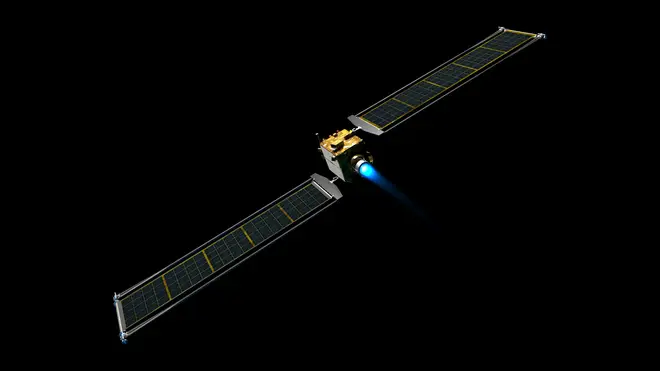
Clive Bull 1am - 4am
25 November 2021, 13:34

The double asteroid redirection test (Dart) will test defence technologies for preventing a hazardous asteroid impacting Earth.
Humanity’s longest game of darts has begun with the successful launch of a craft blasted into space to nudge an asteroid off course.
Nasa’s double asteroid redirection test (Dart) is the first test of defence technology designed to prevent a space rock potentially colliding with Earth in the future.
It aims to prove that a spacecraft can autonomously navigate to a target asteroid and intentionally collide with it – called a kinetic impact – at roughly four miles per second (six kilometres per second).
Blasting off on a SpaceX Falcon 9 rocket from Vandenberg Space Force Base in California, in the US, Dart lifted off at 6.21am UK time before detaching itself and venturing off on its one-way trip into space almost an hour later.
Dart’s target is not a threat to Earth, and is the asteroid moonlet Dimorphos (Greek for two forms), which orbits a larger asteroid named Didymos (Greek for twin).
The craft is expected to hit its target between the end of September and early October next year, when the asteroids are a “relatively close” 6.8 million miles (11 million kilometers) from Earth.

The collision will change the speed of the moonlet in its orbit around the main body by a fraction of 1%.
But this will change the orbital period of the moonlet by several minutes – enough to be observed and measured using telescopes on Earth.
Nasa administrator Bill Nelson said: “Dart is turning science fiction into science fact and is a testament to Nasa’s proactivity and innovation for the benefit of all.
Deployment confirmed, @NASA ’s DART is on its way to redirect an asteroid pic.twitter.com/UTxkcJFcq0
— SpaceX (@SpaceX) November 24, 2021
“In addition to all the ways Nasa studies our universe and our home planet, we’re also working to protect that home, and this test will help prove out one viable way to protect our planet from a hazardous asteroid should one ever be discovered that is headed toward Earth.”
Nasa said its target is a perfect testing ground to see if intentionally crashing a spacecraft into an asteroid is an effective way to change its course, should an Earth-threatening asteroid be discovered in the future.
While no known asteroid larger than 140 metres in size has a significant chance of hitting Earth for the next 100 years, only about 40% of those asteroids have been found as of October 2021.

Lindley Johnson, planetary defence officer at Nasa headquarters, said: “We have not yet found any significant asteroid impact threat to Earth, but we continue to search for that sizable population we know is still to be found.
“Our goal is to find any possible impact, years to decades in advance, so it can be deflected with a capability like Dart that is possible with the technology we currently have.”
A short time after Dart set off alone, Nasa confirmed scientists had received signals as it began to roll out solar arrays (Rosa) to provide the solar power needed for its electric propulsion system and these were fully-extended about two hours later.
The spacecraft will demonstrate the Nasa evolutionary xenon thruster – commercial (Next-C) solar electric propulsion system as part of its in-space propulsion.
The system is based on the Dawn spacecraft propulsion system, and was developed at Nasa’s Glenn Research Centre in Cleveland, Ohio, in the US.
By using electric propulsion, Dart could benefit from significant flexibility to the mission timeline.